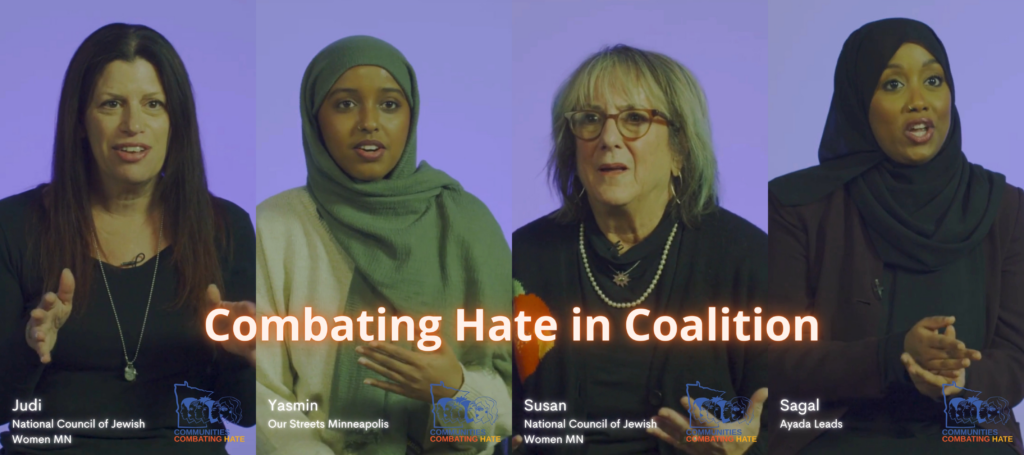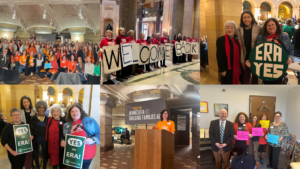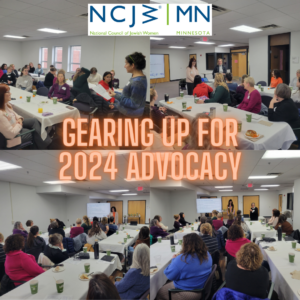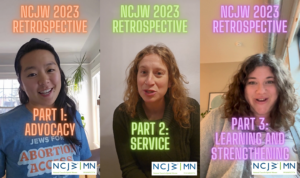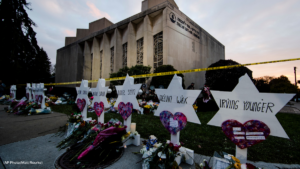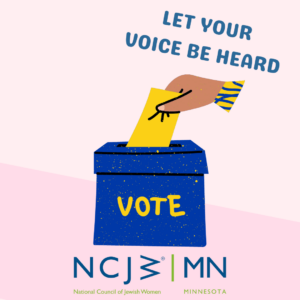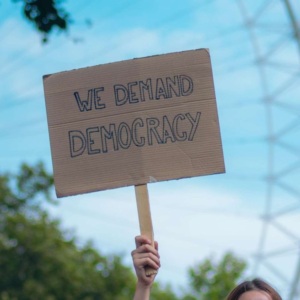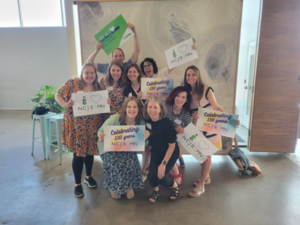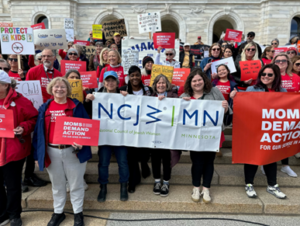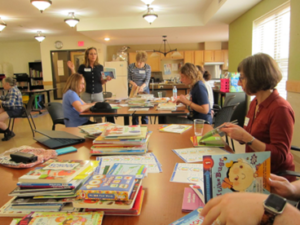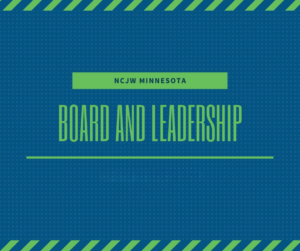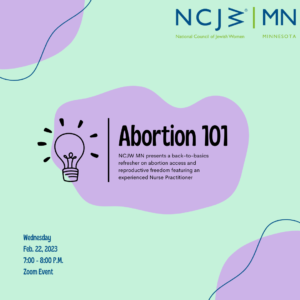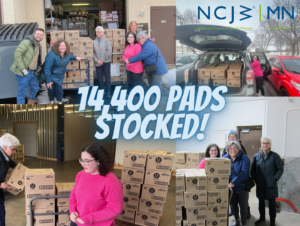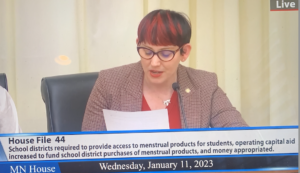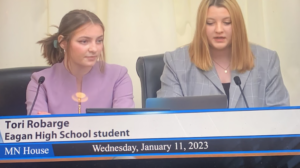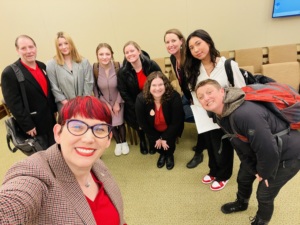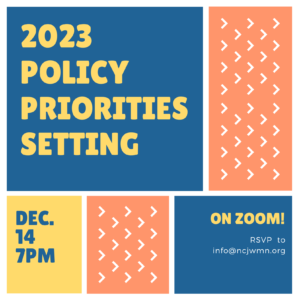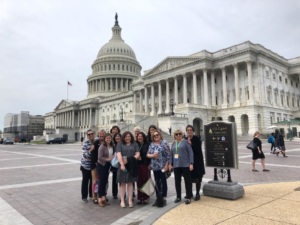
By Erica Solomon, Executive Director
January 26, 2023 [Updated 3/8/2023]
Feel like there’s a lot of action going on at the Capitol this session? Us too! There has been so much great progress on issues of importance to NCJW in just these first few weeks of 2023. Here’s a guide to the legislation that we’re supporting and/or following. We’ll do our best to keep this post updated, but things happen fast! For the most up-to-date news about specific bills, we recommend using the MN Legislature’s MyBills tool and keeping in touch with your district’s representatives (even if they are “on your side” of an issue, it’s crucial that they hear words of support and gratitude from constituents). If you need to double check who represents you in the state legislature, you can find them using this link.
HF44/SF50: K-12 Menstrual Equity
Chief authors: Representative Sandra Feist and Senator Steve Cwodzinski
The K-12 menstrual equity bill, which NCJW has partnered on with the chief authors and a team of student and community advocates, would require that period products be freely available in all 4th-12th grade student restrooms, and provide schools with the necessary funding. Access to period products is a matter of gender, health, and education equity, and it is far past time to ensure that no students in our state miss class because they lack access to or cannot afford the menstrual products they need.
Status as of 3/8: The Menstrual Equity Bill has completed its hearings in House and Senate Committees and is now awaiting a floor vote. We are so grateful for the advocacy of the legislators championing the bill as well as the students and school staff that have provided powerful testimony at its hearings.
HF2488/SF1215: Higher Ed Menstrual Equity
Chief authors: Representative Sandra Feist and Senator Oumou Verbeten
The higher education menstrual equity bill would require that period products be made freely available to students of state-funded colleges and universities in Minnesota.
Status as of 3/8: HF2488/SF1215 had its first hearing with the Senate Higher Education Committee on March 2, and is currently awaiting its first hearing in the House.
HF91/SF70: Reproductive Freedom Codification Act
Chief authors: Representative Tina Liebling and Senator Erin Maye Quade
This bill, championed by the UnRestrict Minnesota Coalition, would repeal unnecessary and unconstitutional abortion restrictions in Minnesota. The restrictions in question—including a two-parent notification law for minors, a mandatory 24-hour delay period for patients seeking abortion care, a requirement that providers recite state-mandated anti-abortion propaganda to patients, and restrictions on qualified practitioners providing abortions—create dangerous ambiguities in our laws, impose unwarranted barriers to abortion access, and undermine the fundamental right to reproductive autonomy in our state. By repealing these unconstitutional restrictions, HF91/SF70 will ensure that anyone in Minnesota can access abortion care.
Status as of 2/2: HF91/SF70 had its first hearings in the House Health Finance and Policy Committee (Jan.12) and the House Judiciary Finance and Civil Law Committee (Jan. 24). On January 26, the House Public Safety Policy and Finance Committee approved the bill, sending it on to the House Ways and Means Committee, which re-referred it to the House Health Finance and Policy Committee for a hearing originally scheduled for Thursday, February 23rd (which has now been delayed due to weather). In the Senate, the bill has been heard by the Health and Human Services Committee and passed with amendments by the Senate Judiciary and Public Safety Committee.
HF1/SF1: PRO Act
Chief authors: Representative Carlie Kotyza-Witthuhn and Senator Jennifer McEwen
The Protect Reproductive Options (PRO) Act would codify the fundamental right to abortion and protect reproductive rights, justice, and access to essential healthcare in Minnesota.
Status as of 3/8: Governor Walz signed the PRO Act into law on January 31, making Minnesota the first state to codify abortion rights after the fall of Roe v. Wade.
HF366/SF165: Reproductive Freedom Defense Act
Chief authors: Representative Tina Liebling and Senator Lindsey Port
The Reproductive Freedom Defense Act would cement Minnesota’s status as a safe harbor for people exercising their reproductive autonomy by protecting anyone in Minnesota seeking abortion care, as well as providers in the state, from prosecution under laws aimed at imposing other states’ abortion restrictions on us.
Status as of 2/21: The House version of this bill has been approved, with amendments, by the House State and Local Government Finance and Policy, Judiciary Finance and Civil Law, and Health Finance and Policy Committees, and will have its next hearing with the House Ways and Means Committee. The Senate version is still awaiting its first hearing with the Senate Health and Human Services Committee.
HF289/SF366: Positive Pregnancies Support Act
Chief Authors: Representative Liz Olson and Senator Mary Kunesh
The Positive Pregnancies Support Act would shift state funding away from crisis pregnancy centers and toward agencies providing genuine help to pregnant people by banning states grants to agencies that encourage clients toward one pregnancy outcome over another, as well as by requiring state grant recipients to provide pregnant people with medically accurate information and services with regard to abortion and pregnancy.
Status as of 2/21: The House version of this bill will have its first hearing with the House Health Finance and Policy Committee and the Senate version has been referred to the Senate Health and Human Services Committee.
HF181/SF691: Bias and Discrimination Reporting and Response
Chief author: Representative Samantha Vang
HF 181, which is supported by the Communities Combating Hate Coalition (led by Jewish Community Action), does not yet have a companion bill in the Senate. This bill would improve data gathering and reporting around bias and discrimination, and create a Bias Response and Community Equity Outreach Team to provide communities that experience acts of hate with culturally-specific support.
Status as of 1/24: This bill had its first hearing in the House Public Safety Finance and Policy Committee on January 17th, 2023.
HF25/SF524: Crime Reform
Chief author: Representative Cedrick Frazier and Senator Ron Latz
The Crime Reform Bill, which has strong support from our coalition partners at Mothers Against Community Gun Violence, would provide funding for an expansion of community-based crime prevention services, including victim services programs, juvenile diversion programs, and social service workers to accompany police responding to individuals who are experiencing mental health crises.
Status as of 2/8: HF25 was approved by the House Public Safety Finance and Policy Committee on January 19th, 2023, and will have its next hearing in the House Ways and Means Committee.
HF14/SF1116: Expanded Background Checks
Chief Author: Representative Dave Pinto
This House bill would require criminal background checks for all firearm transfers, and expand the grounds on which transferees can be disqualified from receiving a gun permit.
Status as of 2/8: HF24 had its first hearing with the House Public Safety Finance and Policy Committee on February 3rd. It is scheduled for its next hearing with the House Judiciary Finance and Civil Law Committee on February 9th.
HF15/SF1117: Red Flag Law
Chief Author: Representative Cedrick Frazier
The “red flag” or “extreme risk protection order” (ERPO) bill would enable family members or law enforcement to petition the courts to prevent people who pose a significant danger to themselves or others from possessing firearms.
Status as of 2/8: HF15 had its first hearing with the House Public Safety Finance and Policy Committee on February 3rd. It is scheduled for its next hearing with the House Judiciary Finance and Civil Law Committee on February 9th.
HF396/SF916: Safe Firearm Storage
Chief Author: Representative Jamie Becker-Finn
This bill would mandate the safe storage of all firearms and ammunition, and would impose criminal penalties for violations.
Status as of 2/8: HF396 had its first hearing with the House Public Safety Finance and Policy Committee on February 3rd.
SF353: Capitol Complex Safety
Chief Author: Senator John Marty
This Senate bill would prohibit the possession of dangerous weapons in the state Capitol Complex.
Status as of 1/26: SF353 has been referred to the Senate Judiciary and Public Safety Committee, with its hearing date to be determined.
HF601/SF606: Lost or Stolen Firearms Reporting
Chief Author: Senator Bonnie S. Westlin
This bill would require the prompt reporting of lost or stolen firearms.
Status as of 2/8: SF606 has been referred to the Senate Judiciary and Public Safety Committee, with its hearing date to be determined. It had its first hearing with the House Public Safety Finance and Policy Committee on February 3rd.

